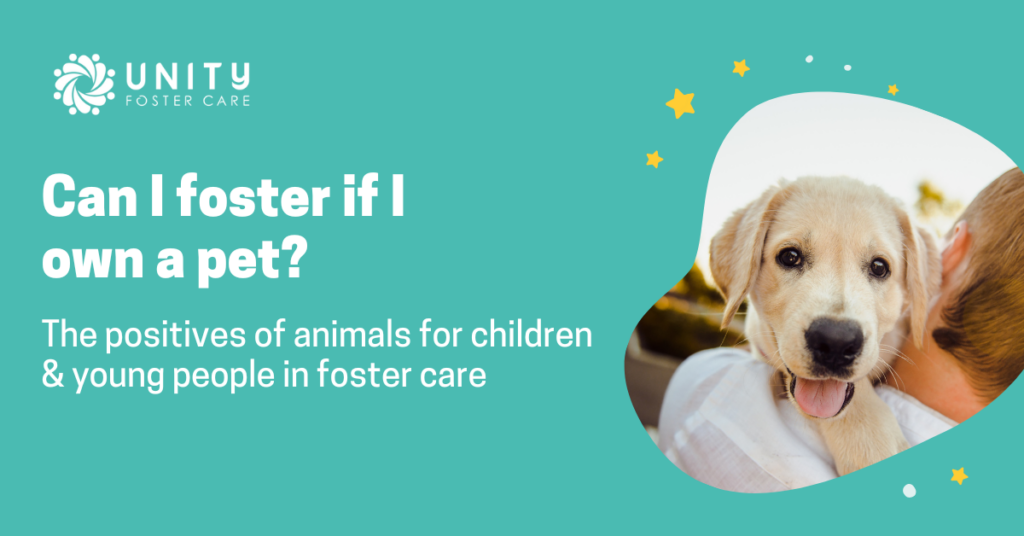Can I foster if I own a pet? The positives of animals for children & young people in foster care

If you’re considering becoming a foster carer, you may be asking whether it’s okay to foster with a pet in the house. Most of the time, the answer to this question is yes, depending on the individual placement in question. In fact, pets can present many positives when fostering.
It goes without saying that going into foster care can be a challenging experience for children and young people who have been separated from their birth families. During this difficult time, the presence of a pet can provide a huge source of emotional support, stability, and a sense of companionship.
Here are our top five benefits of owning a pet when fostering…
Emotional support and unconditional love
Pets have an innate ability to provide unconditional love and emotional support which can be especially crucial for foster children. These children may have experienced trauma, loss, or feelings of abandonment. The presence of a pet can help alleviate their anxiety and provide a consistent and loving presence in their lives. Pets offer a safe space for children to express their emotions without judgment, creating a sense of comfort and security.
Companionship and reduced loneliness
Foster children often face challenges in building stable relationships due to frequent changes in their living situations. Pets can serve as constant companions, offering a sense of consistency and stability. The companionship provided by pets can help alleviate feelings of loneliness, provide comfort during difficult times, and reduce the emotional impact of separation and placement changes. Pets become trusted confidants and devoted friends, helping foster children navigate their emotional journeys. This benefit was especially highlighted during the Covid pandemic, when a 2020 Mental Health Foundation study found that 68% of pet owners in the UK felt their pet provided emotional and mental health benefits.*
Improved emotional wellbeing and mental health
Interacting with pets has been proven to have significant positive effects on mental health and emotional well-being. For foster children, the presence of a pet can help reduce symptoms of anxiety, depression, and post-traumatic stress disorder (PTSD). Caring for a pet can give foster children a sense of purpose, responsibility, and self-worth. Engaging in activities like playing, walking, or simply cuddling with their furry friends releases endorphins, fostering a sense of happiness and improving overall emotional health. A recent study showed that children aged 2 to 5 with a family dog were more active, spent less time on screens, and slept more on average, than those without a pet.**
Development of empathy, nurturing, and social skills
Caring for a pet can teach foster children important life skills, such as empathy, nurturing, and responsibility. The relationship with a pet provides opportunities for foster children to develop and practice these skills in a safe and non-judgmental environment. By understanding the needs of their pets, children learn to be compassionate, patient, and considerate. These skills can extend beyond their interactions with animals, positively impacting their relationships with peers and caregivers.
Pets also act as social catalysts, encouraging social interactions and helping foster children develop better communication and social skills. Pets provide common ground for conversation and bonding with peers, as well as a source of comfort when facing unfamiliar social situations.
Increased self-esteem and sense of identity
Children and young people in foster care may often struggle with their sense of self-worth and identity due to the disruptions in their lives. Pets can play a significant role in improving self-esteem and fostering a positive sense of identity. Caring for a pet successfully and witnessing their pet’s growth and well-being can instill a sense of accomplishment and pride. The bond formed with a pet can become an integral part of a foster child’s identity, providing a source of stability and belonging.
The positive impact of pets on foster children is undeniable. From providing emotional support and companionship to fostering empathy, social skills, and a sense of identity, pets have the power to transform the lives of these resilient children. The unconditional love, loyalty, and unwavering support offered by pets can help these children to heal, grow, and thrive as they navigate the challenges of foster care.
Make a difference to the lives of children and young people, start your application today with Unity Foster Care today. Our friendly team are on hand to answer any questions you may have, as well as support you in starting your fostering journey.
To make a start on your application, call us on 0333 772 2333 or contact us online and we’ll be in touch.
* https://blog.gitnux.com/pets-and-mental-health-statistics/
** https://www.bbc.com/future/article/20220609-do-pets-help-childrens-development
